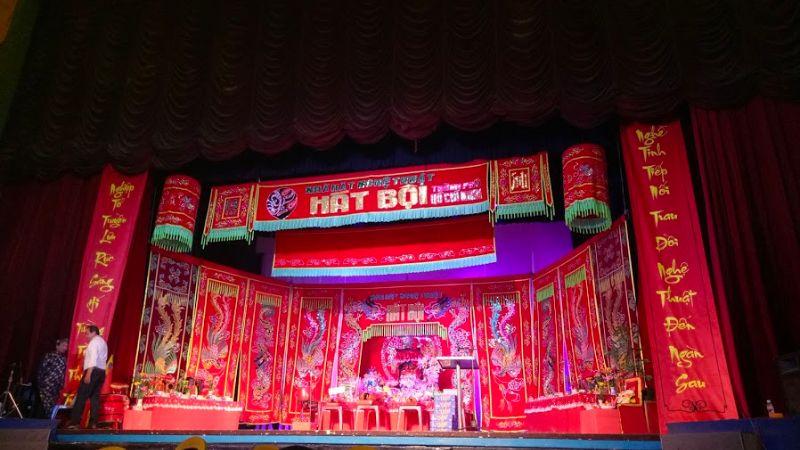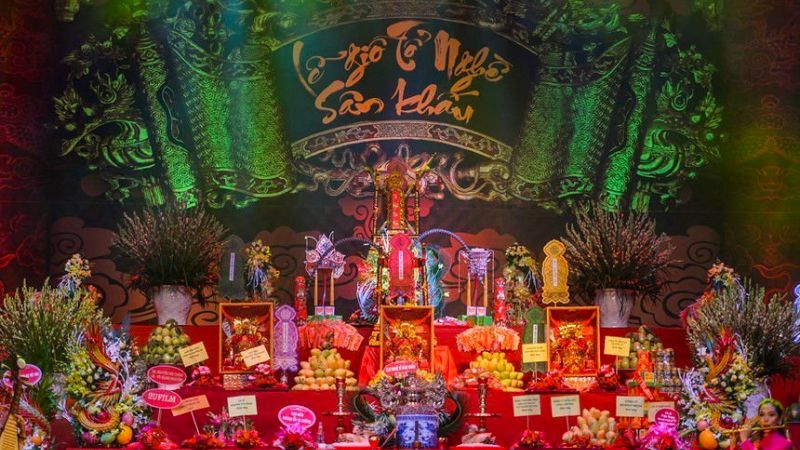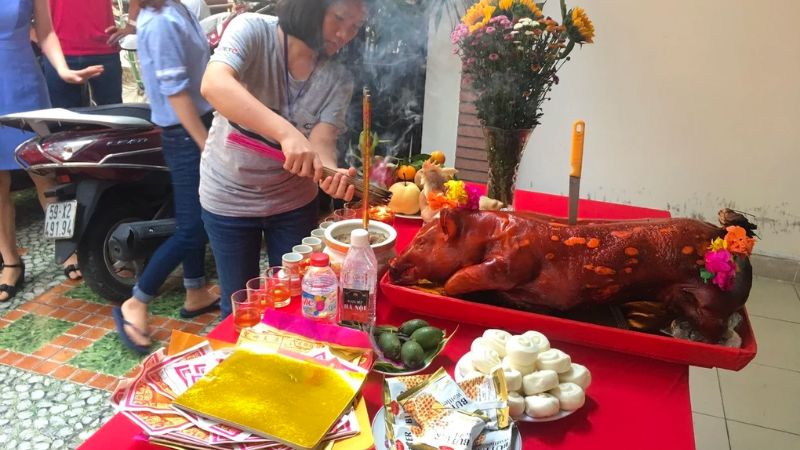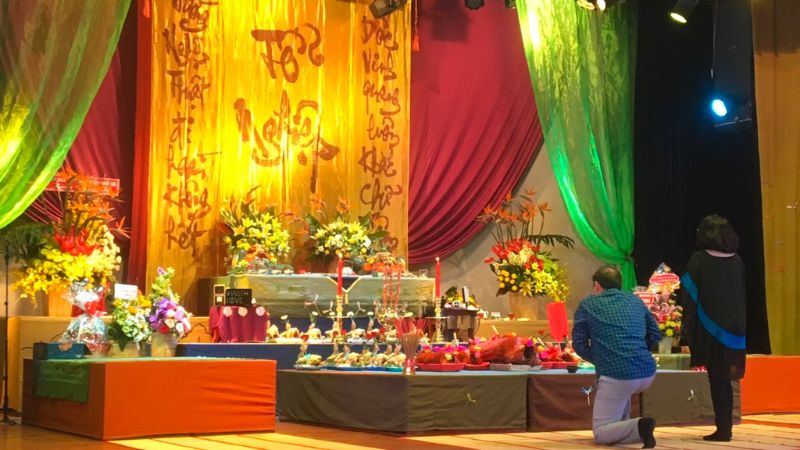Ancestral Worship for professions is a significant spiritual ritual for anyone engaged in a particular trade or profession in society. It expresses gratitude and remembrance for the contributions of ancestors who founded and developed the profession, as well as wishes for a smooth and prosperous career.
Join us as we explore the 16 most famous Ancestral Worship days for professions and learn about the rituals involved in this meaningful tradition through this article!
1 Significance of Ancestral Worship for Professions
Ancestral Worship for professions is also known as Worshipping the Founding Masters or the Holy Ancestors, believed to be the founders and propagators of specific trades and professions in society.
On the other hand, some ancient professions may not have a known founder, but their development and prosperity are attributed to later individuals. Thus, Ancestral Worship may also honor those who have preserved and advanced a profession for future generations.
 Significance of Ancestral Worship for Professions
Significance of Ancestral Worship for Professions
This ritual is a cultural tradition in our nation, serving as a reminder of longstanding values and an opportunity for practitioners to come together, reinforcing their faith in their chosen profession.
Moreover, Ancestral Worship for professions conveys wishes and prayers for peace, prosperity, and success in one’s work throughout the year.
2 Famous Ancestral Worship Days for Professions
Here is a list of some well-known Ancestral Worship days for various professions:
- Ancestral Worship Day for the Medical Profession: 15th day of the first lunar month
- Ancestral Worship Day for the Construction and Mechanical Engineering Profession: 20th day of the first lunar month
- Ancestral Worship Days for the Trading Profession: 10th to 15th day of the third lunar month
- Ancestral Worship Day for the Hairdressing Profession: 16th day of the third lunar month
- Ancestral Worship Day for the Tattoo and Piercing Profession: 22nd or 16th day of the third lunar month
- Ancestral Worship Day for the Baking Profession: 18th day of the fifth lunar month
- Ancestral Worship Day for the Embroidery Profession: 12th day of the sixth lunar month
- Ancestral Worship Days for the Carpentry Profession: 13th day of the sixth lunar month and 20th day of the twelfth lunar month
- Ancestral Worship Day for the Performing Arts Profession: 12th day of the eighth lunar month
- Ancestral Worship Day for the Makeup Profession: 12th day of the eighth lunar month
- Ancestral Worship Days for the Spa Profession: 18th day of the eighth lunar month or 3rd day of the eleventh lunar month
- Ancestral Worship Day for the Nail Care Profession: 3rd day of the tenth lunar month or 13th day of the eleventh lunar month
- Ancestral Worship Day for the Accounting Profession: 10th day of November (Gregorian calendar)
- Ancestral Worship Day for the Tailoring Profession: 12th day of the twelfth lunar month
- Ancestral Worship Day for the Automotive Repair Profession: 12th day of the twelfth lunar month
- Ancestral Worship Day for the Mechanical Engineering Profession: 20th day of the twelfth lunar month (20th day of the last lunar month).
 Famous Ancestral Worship Days for Professions
Famous Ancestral Worship Days for Professions
3 How to Perform Ancestral Worship for Professions?
To conduct Ancestral Worship for professions, a profession-specific altar is typically required. If one does not exist, practitioners can contribute to establishing one at a convenient location.
Setting up an Altar for Ancestral Worship
The altar serves as a place for practitioners to offer incense and pay respects regularly. The setup may vary depending on the profession and beliefs. Here are some general guidelines:
- Consult a Feng Shui master to determine the most auspicious direction for the altar, as this can bring smoother operations and greater career success.
- Avoid placing the altar in the middle of an entrance or under a window.
- Choose a quiet and solemn location for the altar.
- Consider placing greenery near the altar to enhance vitality and attract wealth.
- Maintain the altar’s cleanliness, ensuring it remains free from dust and neglect.
 How to Perform Ancestral Worship for Professions
How to Perform Ancestral Worship for Professions
Offerings for Ancestral Worship
Each profession may have unique offerings, but there are also some standard items, including:
- 2 bouquets of fresh flowers
- 2 large candles
- A tray of five types of fruit
- , white rice, dried tea, and sweet rice wine
- 1 plate of betel and areca nuts
- Savory dishes: steamed sticky rice, boiled or roasted chicken, boiled or roasted pork, sweet and savory cakes, etc.
- 5 long incense sticks
 Performing Ancestral Worship
Performing Ancestral Worship
Performing Ancestral Worship
The representative of the village or guild, dressed appropriately and solemnly, will offer incense and prayers after carefully preparing the offerings. The ritual includes the following steps:
- Light the candles and pour wine into 1, 3, or 5 cups
- Light 1, 3, or 5 incense sticks, then pray and place the incense in the incense burner
- Read the prayer for Ancestral Worship, bowing once after each section
- Wait for the incense to burn out mostly
- Pray to conclude the ceremony and burn the gold and silver paper offerings
- Sprinkle rice, salt, and wine around the altar
We hope this article provided you with valuable insights into the popular Ancestral Worship days for professions and the rituals involved. May your career be blessed with abundance and success!
Uncover the secret Feng Shui master’s tips for decluttering your home to invite wealth and abundance in the Year of the Ox 2021.
With the Lunar New Year approaching, every family is busy shopping and tidying up their homes to welcome the new year with a fresh start. However, according to Feng Shui beliefs, it is important to clean the house at the end of the year in a way that aligns with good Feng Shui principles and avoids any Feng Shui taboos that could potentially bring negative energy and affect the overall luck of the family in the new year. This knowledge is not widely known to everyone.



































